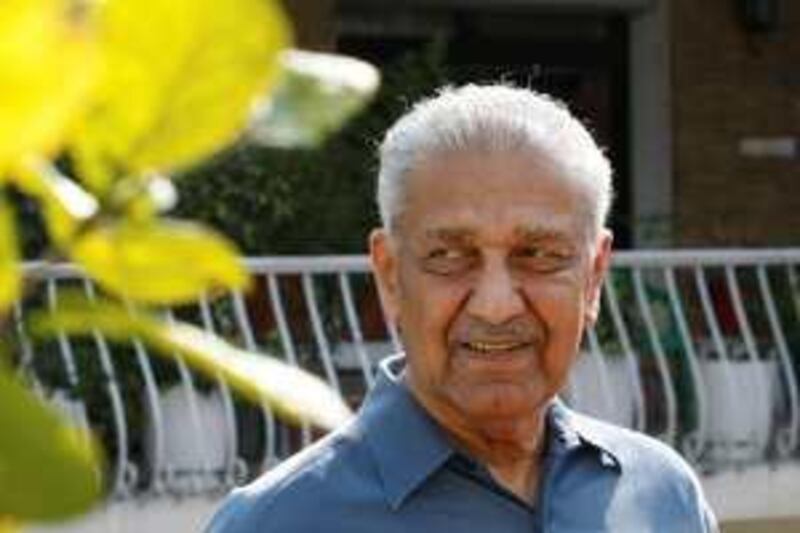ISLAMABAD // Last week a high court in Islamabad lifted the house arrest of Abdul Qadeer Khan, the nuclear proliferator hailed as a national hero and the father of the country's atomic bomb. While the surprise decision has rejuvenated his supporters, it drew sharp criticism from the United States and other western countries and has also led to questions in Pakistan over how extensive Mr Khan's role was in the country's nuclear programme.
But the euphoria over Mr Khan's supporters has already been dampened as it becomes clear his freedom is conditional and a broad umbrella of government security will continue to loom over him, apparently because of threats to his life. Mr Khan, a metallurgist by training, had confessed to running the world's largest private proliferation network in a televised emotional public apology in Feb 2004. He was pardoned by the former president Pervez Musharraf but was put under virtual house arrest.
Pakistani officials have taken great pains to assuage international concerns that Mr Khan's release would result in the resurgence of his proliferation network. The release has come only after an "understanding" between the government and Mr Khan, according to his wife, Henny. While the Khans remained tightlipped over the details of this secret understanding, Pakistani officials say Mr Khan will only be able to meet his friends and family after getting approval from the security agencies. He is not allowed to travel abroad and needs to inform the government 48 hours in advance of his travel plans within the country. Mr Khan has also agreed not to talk about his work or the country's nuclear programme.
This has led staunch supporters of Mr Khan to declare his release as a "farce". "Suddenly the government, under pressure from external forces, once again put such conditionalities on [Mr Khan] that effectively his old incarceration status has been revived, " Shirin Mazari, the spokesperson of political party Tehreek-e-Insaaf, wrote in an article last week. While Mr Khan's role in the country's nuclear programme continues to be glorified by his broad base of supporters, piercing questions about his controversial conduct and actual contribution to the making of the nuclear bomb have also started surfacing.
Television talks shows have also started debating the controversies surrounding the saga of Abdul Qadeer Khan. Critics say that an orchestrated and systematic media public relations campaign launched by Mr Khan since the 1980s built up his myth of being the "father of the country's nuclear programme". Subsequently, his persona assumed a folkloric stature. This myth provided Mr Khan with perpetual immunity and protection from all criticism at home and all accountability following the revelation of his proliferation activities.
Mr Khan headed the centrifuge enrichment plant at Kahuta, which has been the public face of Pakistan's nuclear programme. But he was not involved in all the critical steps before and after uranium enrichment and the actual design, development and testing of Pakistan's nuclear weapons. "It was a multi-disciplinary and institutional team effort spanning over three decades," said M A Chaudhry, an Islamabad-based independent researcher, who is writing a book on the country's nuclear programme.
"The nuclear programme's success involved the mastery of several-high technologies by hundreds of scientists and engineers rather than one single individual." Nuclear tests by Pakistan in 1998 were carried out by the Pakistan Atomic Energy Commission in response to Indian's testing of its nuclear device. Mr Khan was invited to Chaghi, the nuclear test site, merely as a guest. "He was heading only one project and not the entire nuclear programme. Everything else from uranium exploration, refining, conversion, fuel fabrication, plutonium production and reprocessing to nuclear weapons development was developed and run by the Pakistan Atomic Energy Commission in over 20 labs and projects", said Mr Chaudhry.
"Every bit was as crucial to the bomb as uranium enrichment, which was the only step that Khan headed." But despite the critical voices that question the veracity of Mr Khan's claims that he single-handedly was able to steer this poverty-stricken nation to the status of a de-facto nuclear state, his myth remains unshaken and continues to awe public imagination. Interestingly, conspiracy theories abound regarding the circumstances of Mr Khan's release.
Some, like defence analyst Zaid Hamid, have even gone as far as declaring the release part of a "grand American design to denuclearise Pakistan". Mr Khan is known to relish media attention and some fear he might make statements that will implicate the Pakistani military in his proliferation activities. This would consequently increase pressure on the Pakistani government to hand him over to the United States or the International Atomic Energy Commission.
The Musharraf government did not allow foreign investigators to question Mr Khan. "[Khan] wants to get even with those who humiliated him, even if it means ditching the very country which gave him all he has," said Zaid Hamid, a defence and security analyst who also hosts a popular television show on current affairs. "He has a serious ego problem and can go to any lengths to settle old scores, even compromising the national security."
smasood@thenational.ae





